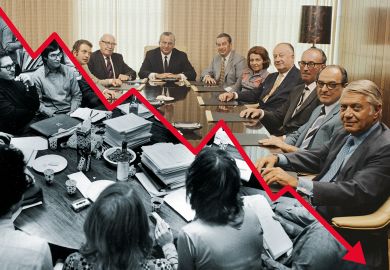The University of Northampton has refused to release any minutes from meetings of its board of governors, prompting the main sector union to raise concerns about transparency in English higher education.
Times Higher Education had submitted a request to Northampton under the Freedom of Information Act for minutes from board of governors and audit committee meetings in 2014. But Northampton, which recently issued a £230 million public bond to finance a move to a new campus, refused.
The University and College Union predicted that it would take “government intervention” to force university leaders to be more open.
Northampton says in its refusal notice, which THE has appealed: “The minutes of our board of governors and our audit committee are exempt under Section 43 (commercial interests) of the Freedom of Information Act 2000.”
The university did not state in its notice whether it had weighed any public interest arguments in favour of release.
Northampton does not make any minutes or papers from governors’ meetings generally available on its website.
Some universities do publish minutes and papers from their governing bodies online. Guidance from the Committee of University Chairs says only that such documents “should generally be available for inspection by staff and students”.
Transparency standards are higher for other public authorities. The code of governance for NHS foundation trusts states: “The board of directors must make board meetings and the annual meeting open to the public.”
A review of Scottish university governance, published in 2012 and led by Ferdinand von Prondzynski, principal of Robert Gordon University, recommended that “meetings of governing bodies should normally be held in public”.
Sally Hunt, UCU general secretary, said: “It is simply not good enough to try to hide behind flimsy excuses such as commercial confidentiality.
“There are huge sums of money, often public funds, at stake here, and people have a right to know how the money is being apportioned and why. It will probably take government intervention to force leaders to be more open as the sector has ultimately failed to self-regulate.”
A Northampton spokeswoman did not respond to a query about why the university deems all governors’ minutes to be exempt because of “commercial interests”. The THE FoI appeal is being dealt with “in accordance with the university complaints procedure”, she said.
Register to continue
Why register?
- Registration is free and only takes a moment
- Once registered, you can read 3 articles a month
- Sign up for our newsletter
Subscribe
Or subscribe for unlimited access to:
- Unlimited access to news, views, insights & reviews
- Digital editions
- Digital access to THE’s university and college rankings analysis
Already registered or a current subscriber? Login





